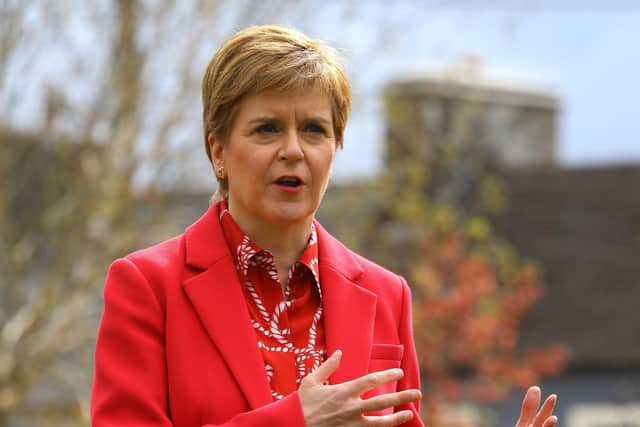Why Nicola Sturgeon needs to act decisively over an independence referendum – Joyce McMillan
Labour, she said, needed to stop using “fluffy language”, and promise decent, secure jobs that pay enough to get a home and look after a family.
Put like that, it doesn’t seem like much to ask. Yet as the stresses of the pandemic have made even more apparent than before, for millions of British workers – in the “flexible” labour market we have been developing since the 1980s, and in “left behind” working class areas like Hartlepool – those goals of a secure job, a secure home, and a decent family wage now seem more like a dream, than a reality towards which they can sensibly aspire.
Advertisement
Hide AdAdvertisement
Hide AdOne of the striking things about last week’s series of elections across the UK, in other words, was the near-total absence from the results of any evidence of overt class politics, at a time when the poorer half of Britain’s population, battered by a dozen years of stagnant wages, deteriorating working conditions, slashed benefits and decimated public services, has arguably never needed class politics more.
Instead, in Scotland Wales, and most parts of England, voters clearly opted in a majority or near-majority for the party that most strongly expresses their national identity, or seems most clearly to represent the nation in the current pandemic crisis.
This is not to say, of course, that the politics of all three countries are the same; both the SNP in Scotland, and Welsh Labour under Mark Drakeford, are broadly social democratic parties, and have little in common with a UK Conservative Party whose oppressive right-wing attitudes were on full display in this week’s repellent Queen’s Speech.
It is the Conservative Party that has sought, during the last decade of British politics, to wrap first the unnecessary pain of austerity, and then the historic folly of Brexit, in a cloud of nostalgic Union Jack patriotism with a Vera Lynn soundtrack.
And if the strategy has played well in many parts of England – although not, notably, in anti-Brexit cities like London and Manchester – it has also, perhaps inevitably, emphasised the growing distance of political culture between the Tory government at Westminster, and large majorities in both Scotland and Wales who no longer have any truck with that brand of Conservatism.


All of which raises searching questions for Nicola Sturgeon’s new Scottish government, as it takes up office over the coming week.
As Angela Rayner’s comments suggest, politics across the UK, and beyond, now needs a profound and radical shift away from the market models of the last 40 years, and towards a carefully managed transition to a low-carbon economy that can only succeed if the state steps in on a substantial scale, as during the pandemic, to guarantee the basic security of ordinary citizens during the transition.
It’s against this backdrop that Scotland’s governing party now needs to set out its stall for the coming half-decade; and the key question it has to determine, without delay, is how to handle the question of independence, in such a momentous context.
Advertisement
Hide AdAdvertisement
Hide AdNicola Sturgeon’s first instinct, as she tries to steer Scotland out of the pandemic, might be a steady-as-she-goes emphasis on sensible government in troubled times, allowing Scottish voters gradually to draw their own conclusions about our constitutional future.
Yet the levels of unrest inside the independence movement, and the sheer aggression of the Conservative Party’s single-minded emphasis on alleged weaknesses in the case for independence, suggest that she may soon have to be bolder, if she wants the SNP to lead Scotland out of the Union any time in the next decade.
On one hand, the outline of the SNP’s post-pandemic manifesto for independence needs to be clarified and published quickly, in the coming months, if Scottish political debate is to avoid becoming an endless Groundhog Day of recurring arguments about Border posts, currency and pensions; not, at this stage, another full 600-page document requiring civil service support, but a short and useful party manifesto, taking clear headline positions on the key questions about independence that arise on Scotland’s doorsteps.
And then at last, if the SNP has the capacity to move the independence debate on in that way, space might begin to open up for a serious debate in Scotland about how, in or out of the UK, we revolutionise our economy to meet the radical demands of the time we live in.
Of course, it would be easier to promote positive debate on those goals if Scotland was not still saddled with a main opposition party obsessed with the constitution, and largely discredited in the eyes of most Scots by its performance at Westminster.
Yet if Nicola Sturgeon wants to avoid another five years of paralysing stasis in Scotland’s constitutional debate, she will nonetheless have to move decisively, and soon; if not towards an imminent referendum, then at least towards a bold and clear statement of the ground on which such a a referendum might be fought.
Otherwise, it will remain all too easy for both opponents and restless allies to continue to ignore or sideline her government’s performance on the vital issues of social justice and sustainability now so marginalised from UK politics, and to continue, instead, with the kind of tired constitutional sniping of which most of Scotland, whether in favour of independence or against it, has now heard more than enough.
A message from the Editor:
Thank you for reading this article. We're more reliant on your support than ever as the shift in consumer habits brought about by coronavirus impacts our advertisers.
If you haven't already, please consider supporting our trusted, fact-checked journalism by taking out a digital subscription.
Comments
Want to join the conversation? Please or to comment on this article.